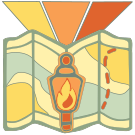Lens of Attention: Non-Judgment
 | |
| Lens: Non-Judgment | |
|---|---|
| Beacons | Attention |
| Landmarks | Acknowledge Negative Emotions Without Judgment Observe Your Judgment and Non-Judgment |
Lenses, in the context of the Beacons of Everyday Enlightenment represent more specific concepts and practices through which we can understand the rich meaning of each Beacon. There are Primary Lenses, which are the most commonly understood and most robust meditative concepts, and there are Other Lenses which are a collection of other closely related ideas for that Beacon.
Non-Judgment means experiencing the present moment as it is, without labeling it as good or bad, right or wrong. In practicing non-judgment, you allow yourself to experience life fully, without the filter of preconceived notions or biases. This Lens also helps in cultivating an accepting attitude towards your own thoughts and emotions, thereby enriching your overall experience of the present moment.
Landmarks
The Realms of Everyday Enlightenment each have some noticeable Landmarks which show the likely alignment someone within that Realm has with each of the Beacons and their various Lenses. These Landmarks are things that need to be noticed and explored in the context of those Lenses and Beacons. And then through working on the Trails and Guides these Landmarks will serve as markers toward the next Realm where new Landmarks await.
Landmarks of Enrollment
Landmark: Acknowledge Negative Emotions Without Judgment
 | |
| Landmark: Acknowledge Negative Emotions Without Judgment | |
|---|---|
| Beacons | Attention |
| Realms | Enrollment |
| Lenses | Non-Judgment |
| Guides | Stressful Moments |
| Trails | Learn About Attention |
The Landmark of Acknowledge Negative Emotions Without Judgment is where you'll discover how often we pass judgement on what goes on around us. The example chosen is driving or commuting, but you can choose anything about your typical day that may be frustrating or boring, or mildly unpleasant in some way. Learning about judgement is the first step in learning about Non-Judgement.
Review these questions to see if you have fully explored this Landmark and are ready to move on.
Landmark Lookouts:
- Observe Emotions: Are you aware of your emotions as entities separate from your core being, observing them come and go?
- Acknowledge Negative Emotions: Can you identify negative emotions as they surface and acknowledge they exist without passing judgement?
Start your daily commute just like any other day, and incorporate these types of practices.
- As you sit in your car, or on the bus or train, notice how you're feeling.
- If it's frustration at the traffic or annoyance at the crowds, let it bubble up.
- Instead of fighting it, recognize it. Say to yourself, "I'm feeling frustrated," or "I'm feeling annoyed."
- Notice how this emotion feels in your body. Is your grip on the steering wheel tighter? Are your shoulders tense?
- As your journey continues, wait for another emotion or feeling to arise, and this time just acknowledge "I notice this feeling."
- Notice that you may still have reactions in your body, like tension, your heart or breath may feel accelerated, you may feel heat in your head.
- Finally, recognize that mental emotions and physical sensations are two different things.
=== Landmark: Observe Your Judgment and Non-Judgment ===
 | |
| Landmark: Observe Your Judgment and Non-Judgment | |
|---|---|
| Beacons | Attention |
| Realms | Enrollment |
| Lenses | Non-Judgment |
| Guides | Doing Chores |
The Landmark of Observe Your Judgment and Non-Judgment is where you will learn about how to simply observe experience and thoughts. Observation is a necessary part of being Non-Judgmental, as it is a neutral way of experiencing things. Additionally, before we can learn more about the thoughts in our mind, we first must learn to Observe them.
Review these questions to see if you have fully explored this Landmark and are ready to move on.
Landmark Lookouts:
- Observe Experience: Are you able to simply observe what is happening, including both what you see, and what you think about what you see?
- Observe Judgment: Can you observe the Judgmental thoughts passing through your mind without judging those thoughts themselves, just observing they are there?
- Observe Non-Judgment: Are you able to observe yourself Experiencing The Now and feel the difference between Judging what you see, and resting in Non-Judgment?
Observing Non-Judgment could be done in many places, but shopping is a great example because this is one place where we see a lot of different things that we commonly "judge" over and over. This is a Landmark of Enrollment so as you go through these steps, remember the goal is to practice simply Observing what is going on around you, and if you have any Judgmental thoughts, "Observe" those thoughts, and let them pass by. Everyone is different, but as you shop, you might have these types of Judgements:
- The parking lot is packed... there will probably be long lines inside.
- This shopping cart has a gross piece of trash in it.
- Why is everyone blocking the aisle?
- His shoes are so dirty.
- This costs way too much.
- Why did they put the apples near the coffee, that doesn't make any sense.
- This line is too long.
During your Shopping, you are going to try two things:
- Observe everything you see, and make sure you take in a variety of things. You want to "Experience the Now", and all the things that are happening.
- If you experience any Judgment about what is happening, try to notice that thought as it passes through your mind.
By doing those two things, you are strengthening your ability to practice Non-Judgment, by first being more present in the moment, and second, learning to replace the Judgment with something else. Here are some counter-examples of how you might Shop with Non-Judgment practicing those two things - observing The Now and observing your judgmental thoughts.
- I have arrived at the parking lot.
- I selected this shopping cart.
- I will come back to this aisle in a few minutes.
- That man is wearing shoes. I see they are dirty, and I see that I am using that to pass judgment on him.
- This item costs $2.99. I can see I am experiencing some sort of frustration because of that.
- There are apples here. There is coffee here.
- I am in a line. There are 4 people in front of me. That person is buying paper towels.
Landmarks of Engagement
Landmarks for this Realm (Engagement) will be added here when those pages are created.
Landmarks of Enrichment
Landmarks for this Realm (Enrichment) will be added here when those pages are created.
Shadows
The Beacons of Everyday Enlightenment provide powerful guidance through the Realms. The Lenses represent different facets of those Beacons, which provide further focus or illumination of that Beacon. On the other hand, Lenses are also accompanied by two types of Shadows which tend to obscure our journey to Enlightenment. The first kind of Shadows are the Looming Shadows, which are the obvious opposite of a given Lens, and should hopefully be easy to avoid and train against once we understand them. The second kind are the Flickering Shadows, which could be confused with the associated Lenses, because they are quite similar to the Lens, while actually being a harmful or negative counterpart. Both types of Shadows should be understood in the context of the Lens and Beacon, and reviewed periodically to ensure our view is not obscured. Within the Lens of Non-Judgment, we are experiencing the present moment without labeling it as good or bad, right or wrong.
- Looming Shadow - Judgmentalism, The pervasive habit of forming judgments or critiques about experiences, contradicting the practice of accepting experiences as they are
- Flickering Shadow - Indifference, When withholding judgment turns into a lack of discernment or apathy, hindering the ability to navigate life's complexities
Resources
- How to Practice Acceptance Without Being Complacent - "Mindful "acceptance" means that we fully acknowledge the current moment (external situation as well as feelings, thoughts, and perceptions) so that we can respond appropriately in the next moment."
- Practicing Non-Judgment - "What would it be like to simply experience something, without judgment?"
- Non-Judgment for Beginners! - "Non-judgment is a HOW skill where we practice being present in the current moment and stating a fact without adding our personal opinion to it."
- Acceptance is not Giving Up, it is Waking Up - "Acceptance allows us to see things as they really are, rather than spending so much time being pulled off-course by our attachment to our desire that things were different."
